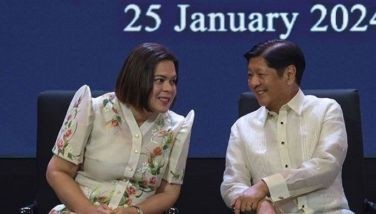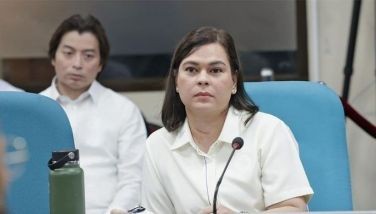EDITORIAL - A test of the justice system
October 1, 2003 | 12:00am
 The Kuratong Baleleng multiple murder case became politicized long before Gloria Macapagal-Arroyo and her lawyers came into the picture. Prosecution witnesses disappeared and police generals including Panfilo Lacson who were close to Joseph Estrada were cleared of the case during his tenure as president.
The Kuratong Baleleng multiple murder case became politicized long before Gloria Macapagal-Arroyo and her lawyers came into the picture. Prosecution witnesses disappeared and police generals including Panfilo Lacson who were close to Joseph Estrada were cleared of the case during his tenure as president.
Now that prosecution lawyers have come up with cause to reopen the case, it’s the turn of the accused to cry politics. Lacson, now an opposition senator who has announced plans to run for president next year, is trying mightily to project the revival of the case as political persecution, and he has achieved some measure of success. His cause has been helped by the judiciary, which is taking its usual sweet time in ruling even on a motion for reconsideration.
The case has been muddled further by the "wreath-laying" last Friday at the Quezon City home of Romeo Callejo Sr., the Supreme Court justice who penned the tribunal’s April 1 ruling that gave the Quezon City Regional Trial Court the go-signal to reopen the Kuratong Baleleng case. The order also elevated Lacson’s culpability from an accessory to a principal accused, which raises the possibility that he could be held without bail once arrest warrants are issued in connection with the case.
Lacson has insinuated that the administration itself had sent Callejo the funeral wreath to make it appear that the senator is intimidating the Supreme Court. No matter who sent the wreath, however, such threats are hazards of the trade in this country. Politicians, government officials, even journalists often get such threats.
No intimidation should deter members of the judiciary from doing their job. In this case, the job is to determine if laws were broken in the killing of 11 members of the Kuratong Baleleng robbery gang. Lacson may yet prove his innocence. But whatever the outcome of the case, it must be based on hard facts, on solid evidence. Anything less will only erode public confidence in the criminal justice system.
BrandSpace Articles
<
>
- Latest
- Trending
Trending
Latest
Trending
Latest
Recommended

January 16, 2025 - 12:00am



























